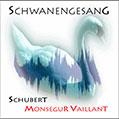|
|
||||||||||||||||||||||||
English Version French Version German Version |
||||||||||||||||||||||||
| English Version | ||||||||||||||||||||||||
SCHWANENGESANGRemembering that E.M. Forster (St. John's, Cambridge, Nobel Prize) expressed the belief that "music is the deepest of the arts" and contrasting the Schwanengesang of the Salzburger Festspiele 1956 (Fisher-Dieskau / Gerald Moore) with Monsegur Vaillant's Schwanengesang (ADG Paris, 2006, where the artist - in the best Schubertian elegance - sings and is her own accompanist), perhaps one might better apprehend why Goethe preferred Zelter to Schubert, utterly assured that Zelter's song-settings would go on making music the menial abigail of poetry, a choice obviously aloof from Shakespeare's timid prayer : "O ! Stay and hear ; your true love's coming, That can sing both high and low..." (Twelfth Night) the "Swan of the Avon" thus enforcing the tradition of "true love" (fin'amors) such as sung by the mediaeval poets of the Oc language, and such as unravelled, in our time, by L.T.Topsfield (St. Cath's, Cambridge, Troubadours and Love, 1975) and Claude d'Esplas (MHRA, Cambridge, Tristan and Isolt, IMA Press, Moscow, 1994) who, last but not the least, sails over the incommensurable oceans of the Mephistophelian "trobar clus" of our Universe (Stephen Hawking's courtesy). Claude d'Esplas< All rights reserved |
||||||||||||||||||||||||
| French Version | ||||||||||||||||||||||||
LE CHANT DU CYGNESi l'on se rappelle que E.M. Forster (St. John's, Cambridge, Prix Nobel) a énoncé qu'il croyait que "la musique est le plus profond des arts" et si l'on contraste le Schwanengesang du Festival de Salzbourg, 1956 (Fischer - Diskau / Gerald Moore) avec le Schwanengesang de Monsegur Vaillant (ADG Paris, 2006) où l'artiste - en la meilleure élégance schubertienne - chante et s'accompagne elle-même, peut-être sera-t-on à même de mieux comprendre pourquoi Goethe préféra Zelter à Schubert, ainsi assuré que les arrangements de Zelter sauraient maintenir la musique dans son rôle de vile servante de la poésie ; nous sommes ici loin de la timide prière de Shakespeare : "O ! Reste et écoute ; ton véritable amour arrive Qui chante haut et bas ..." le "Cygne de l'Avon" perpétuant ainsi la tradition de "l'amour vrai" (fin'amors) tel que chanté par les poètes médiévaux de langue d'oc et tel que débrouillé, de nos jours, par L.T. Topsfield (St. Cath's, Cambridge, Troubadours & Love, 1975) et Claude d'Esplas (MHRA, Cambridge, Tristan et Iseut, IMA Press, Moscou 1994) qui, mieux encore, navigue sur les ondes infinies du méphistophélique sens caché (trobar clus) de notre Univers (courtoisie aidant de Stephen Hawking).
Claude d'Esplas All rights reserved |
||||||||||||||||||||||||
| German Version | ||||||||||||||||||||||||
SCHWANENGESANG Wenn man sich erinnert, dass E.M.Forster (St. John's, Cambridge, Nobel-Preis) den Glauben zum Ausdruck gebracht hat, dass "die Musik die tiefste aller Künste" ist und den Schwanengesang der Salzburger Festspiele 1956 (Fischer-Dieskau / Gerald Moore) mit Monsegur Vaillants Schwanengesang (ADG Paris, 2006, wo die Künstlerin - in der besten schubertschen Eleganz - singt und sich selbst begleitet) kontrastiert, kann man vielleicht besser verstehen, warum Goethe Zelter Schubert vorgezogen hat, nämlich sicher, dass Zelters Vertonungen der Musik immer die Rolle einer niederen Dienerin der Dichtung zuweisen würden; selbstverständlich weit entfernt von Shakespeare schüchterner Bitte "O! Bleib und höre; deine wahre Liebe kommt, Die hoch und tief singen kann..." (Twelfth Night) , CLAUDE D'ESPLAS - Die Musikstunde Übersetzung : Dagmar Coward Kuschke (Tübingen) |
||||||||||||||||||||||||
Soprano and concert pianist

